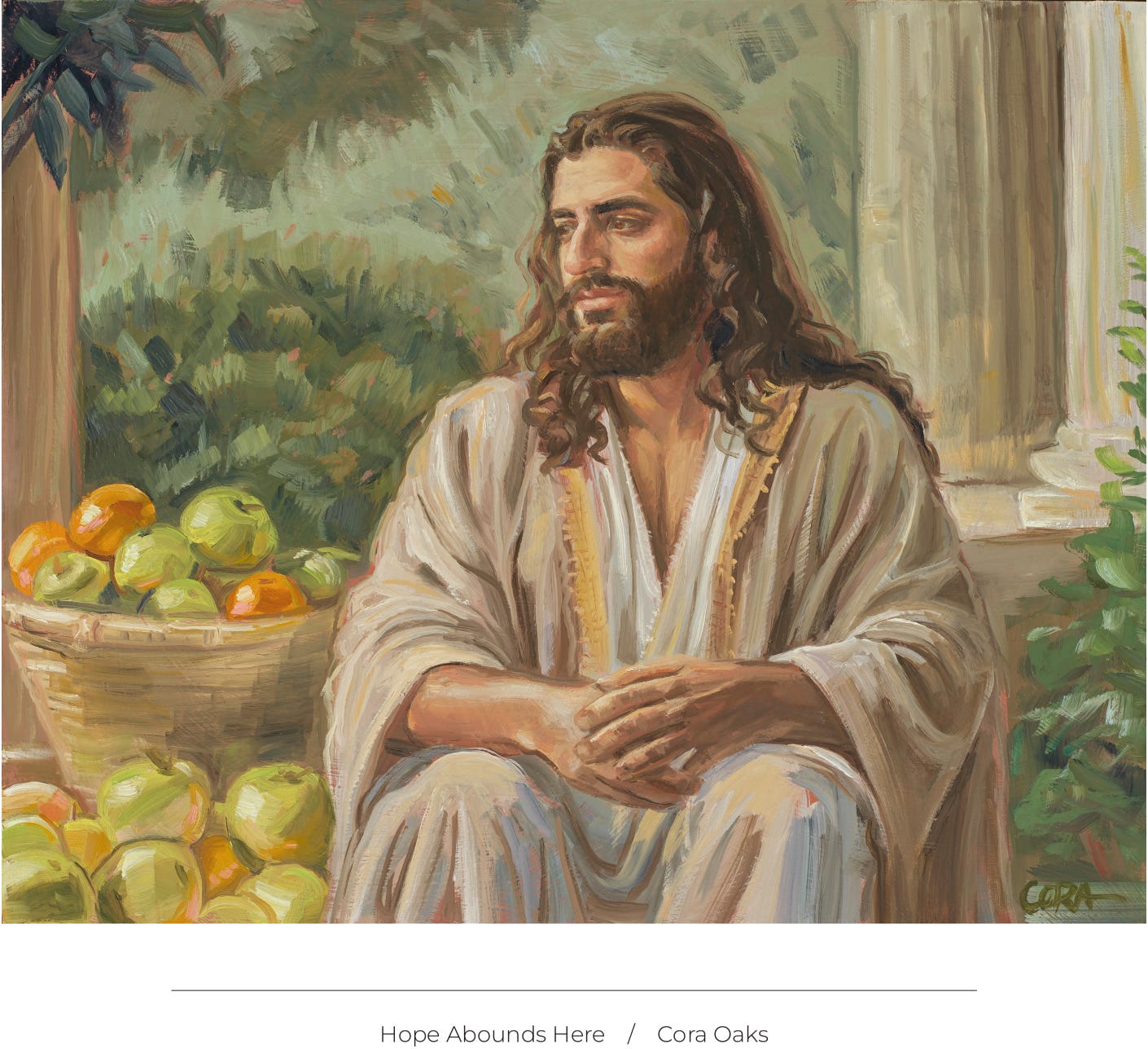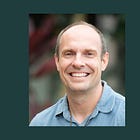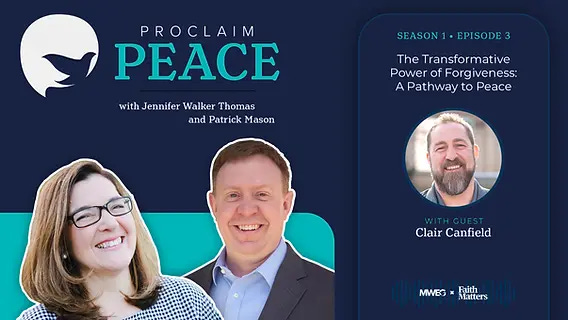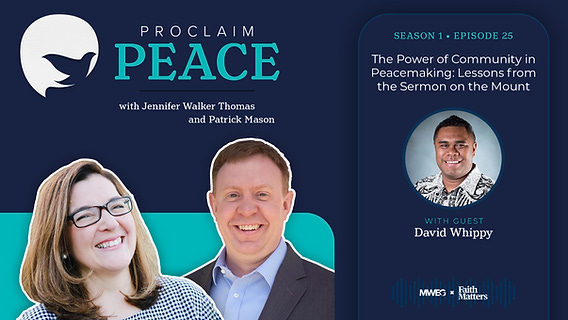What does it mean to forgive?
Faith Matters resources to accompany your Come Follow Me study: June 16-22

“Forgive one another.” Jesus Christ wants me to forgive everyone.
What does the concept of forgiveness have to offer our relationships in the modern world?
We need compassion, but we also need to have a way of naming when we harm other people, and we need a way of restoring. And when no one is really responsible, no one is really forgivable.
There's this sense that no one is really responsible, but also you can't be redeemed. There's a gracelessness about our public conversations. There's a gracelessness, and a resistance to the idea that anyone can really change.
The radical claim of my faith is that anyone can change. No one is beyond the reach of grace. It's my most controversial opinion. And our desire to externalize evil from ourselves into other groups and other people means that we resist that, because “evil is out there, not within me,” is a much more comfortable position psychologically. …
I think part of the reason I want to reclaim sin and its healthy liberatory form is it might help us re-find our way back to forgiveness for ourselves and for each other.
—Elizabeth Oldfield
MORE CONVERSATIONS ON FORGIVENESS
God’s “great work” is built on “small things.”
Brian McLaren: Life After Doom
Brian asks, "What if it doesn't turn out? How will we face the future if things get worse instead of better?" He offers gentle encouragement to reach deeper into ourselves and find a stronger, more resilient type of hope: the kind that, as Václav Havel said, “is not the certainty that things will turn out as we wish, [but] is the conviction that some things are worth doing, no matter how they turn out.”
The Lord asks for my “heart and a willing mind.” I can follow Jesus with my heart and mind.
Philip Barlow: A Thoughtful Faith
At the heart of A Thoughtful Faith for the 21st Century is an urgent and beautiful question: How can we hold together the integrities of our minds and our hearts and our spirits? That question—its weight, complexity, and quiet hope—sits at the center of this conversation today.
Melissa Inouye and Kate Holbrook: Every Needful Thing
Kate and Melissa talked through so many important questions with us, including how we can reconcile both mind and spirit as we live our lives. As the book’s description puts it: “Instead of pushing us to choose between faith and reason, love and law, truth within the restored gospel and truth in the wider world of God’s children, these writers urge us to seek ‘anything virtuous, lovely, or of good report’ and learn to live in a world of complexity and abundance.”
Shima Baradaran-Baughman: Mercy at the Margins
This week, we’re joined by Shima Baradaran Baughman, a nationally renowned expert on criminal justice reform and a law professor at BYU. After years focusing on shaping public policy and reforming systems, Shima began to recognize that the deepest and most lasting change wasn’t coming from legislation alone, but from the quiet, compassionate efforts of faith communities and individuals who were directly transforming lives one by one.
Zion shall be “an ensign unto the people.”
Today, there are Latter-day Saint outposts in virtually every part of the world where the law permits. Gathering now is not only to the cities of the midwest or Great Basin villages, but likewise to stakes in Indonesia and Africa and across the world.
In all of this expansion, we are left with a pressing question: what of those who do not obviously want to be “gathered?” Missionary efforts go on apace—we continue inviting the world’s citizens to gather into worldwide stakes by joining themselves formally to the Church. But what about the vast majority of the world’s population—those who either never hear the call to gather or who hear but, for any of a thousand reasons, never heed it? What is our responsibility toward the billions of our brothers and sisters who do not heed our message? I believe that we are beginning to understand that we have a responsibility to better the world for all of its citizens, whether they choose to be gathered or not.
—Richard Bushman, “How to Save the World”
Zion is not just a location on a map, but a way of relating to each other and to God: “And the Lord called his people Zion, because they were of one heart and one mind, and dwelt in righteousness; and there was no poor among them.”(Moses 7:18) Mary’s last words expressed a longing for both that place where she could be reunited with family and for membership in a “beloved community.” Who among us does not aspire, as Mary did, to live always with our “face toward Zion,” especially as we observe the turmoil, polarization, and contention in our present-day communities? In an age of rampant political conflict, continuing racial tensions, and a social media culture driven by algorithms designed to close our minds, where does one find community? More importantly, how can we build a community worthy of the name Zion? We, too, look toward Zion and yearn for a time when we as a people can “have our hearts be knit together in unity and in love towards one another.”(Mosiah 18:21) We suggest three guiding principles or practices from our field of psychology that can lead us toward Zion: proximity, empathic listening, and humility. As we focus our minds and hearts on the people of Zion, Zion becomes a way of being.
—Ben Ogles & M. Esperanza Dotto, “Facing Zion”
The kingdom of God on earth prepares the world for the Savior’s return. I can help prepare the world to receive Jesus Christ.
Can we … develop societies that are practiced in supporting each other through the daily wear and tear of living in the world? If we can do that, we can be truly prepared for anything. We can bring peace to ourselves, our communities, our world. We can share meals with the families managing the postpartum transitions and intense cancer treatment schedules, and we can also share more moments sitting on the porch listening to children playing, watching for signs of stress, and shouldering the burdens of everyday life and earthly relationships together. Developing those connections creates a network of strength so that the inevitable internal, individual trials are not catastrophic.
—Lizzie Heiselt, “If Ye Are Prepared”
Early Christians believed the return of Christ was imminent. When his return seemed delayed, Paul reassured them that Jesus would return soon, that the righteous would be lifted up, and that the dead would be raised to meet him. As the years continued to pass, Christians developed different interpretations about when Jesus would return and what that return would look like. Here we discuss the chapter, “Facing the End: The Second Coming of Jesus Christ and the Millennium” in Ancient Christians: An Introduction for Latter-day Saints:














